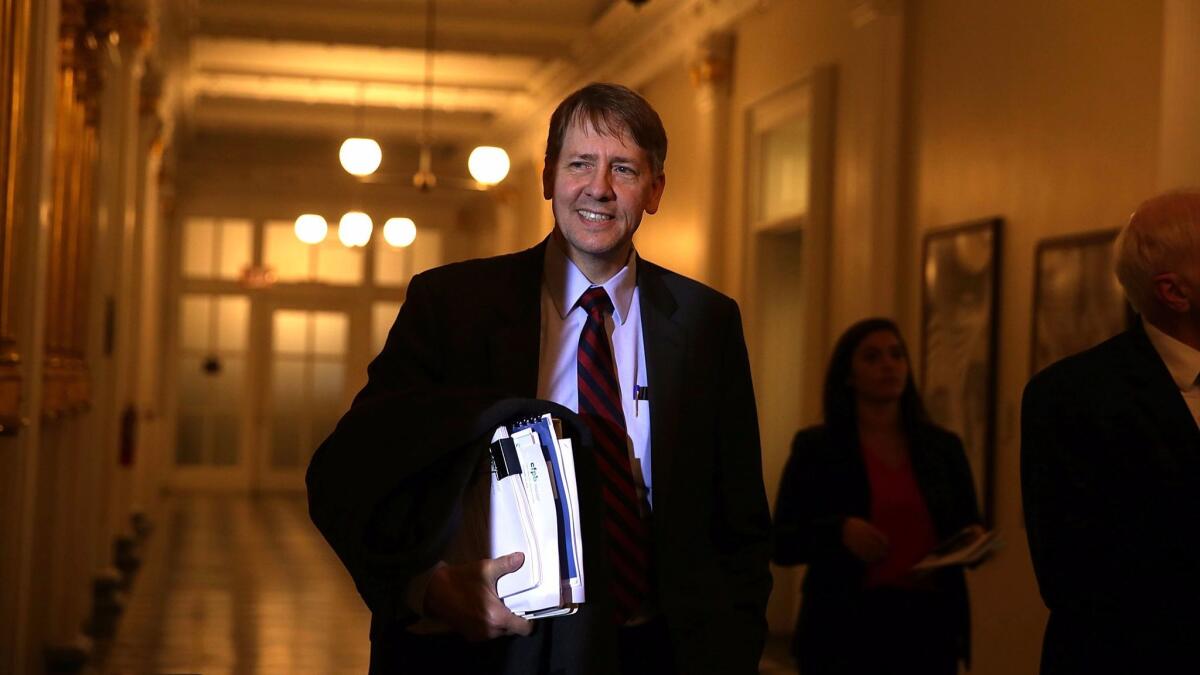Richard Cordray could step down soon, leaving the Consumer Financial Protection Bureau in limbo

The Republican push to oust Richard Cordray as director of the Consumer Financial Protection Bureau soon might get a boost from an unexpected source: Cordray himself.
Cordray’s term as the bureau’s first and only director doesn’t expire until next summer. But there is widespread speculation that he will run for the Democratic nomination for governor of his home state of Ohio.
His departure could leave the controversial watchdog agency, created in the aftermath of the 2008 financial crisis, in limbo for months and jeopardize regulations covering consumer arbitration clauses and payday lending.
A former Ohio attorney general, Cordray would need to step down soon to launch a bid for the 2018 election. The first Democratic candidates debate is Sept. 12. He could announce his intentions as early as Monday, when he is scheduled to speak at the AFL-CIO’s annual Labor Day picnic in Cincinnati.
Cordray’s departure probably would trigger a messy succession fight at the bureau. The Obama-era creation has been praised by consumer advocates for high-profile enforcement actions that have led to billions of dollars in refunds and penalties. But Republicans complain it is too powerful and limits Americans’ access to credit.
It’s unclear who would take over as acting director. And Democrats, led by Sen. Elizabeth Warren (D-Mass.), who conceived of the idea for such an agency, are expected to mount a fierce campaign against whomever President Trump nominates as a replacement.
“I think there will be a very big controversy, and it will become very contentious,” said Alan S. Kaplinsky, head of the consumer financial services group at the Ballard Spahr law firm. “It’s certainly not going to be clear sailing.”
The 2010 Dodd-Frank financial reform law, which created the bureau, says the deputy director becomes the acting head “in the absence or unavailability of the director.”
David Silberman, associate director of the bureau’s Research, Markets and Regulations Division, has been serving as acting deputy director since January 2016.
But the law is unclear about whether the deputy director would take over in the case of a director’s resignation, said Kaplinsky, who closely tracks the bureau’s activities.
That could open the door for Trump to pick an outsider as acting director in accordance with the Federal Vacancies Reform Act. That person would run the agency while a nominee moved through what could be a lengthy Senate confirmation process.
The vacancy law allows the president to designate someone who already has been confirmed by the Senate to perform acting duties. Kaplinsky said that could be Treasury Secretary Steven T. Mnuchin, who would take on the CFPB duties in addition to his Treasury role.
There is precedent for such an arrangement. Treasury Secretary Timothy F. Geithner oversaw the bureau until Cordray became director in early 2012.
A White House spokeswoman did not respond to a request for comment on Trump’s plans to fill a potential bureau vacancy.
“If Silberman is running the bureau, it’s going to look a lot like it looks with Cordray running the bureau. I think you could say they’re two peas in a pod,” Kaplinsky said. “If Mnuchin is running it, I would expect to see changes.”
Those changes could involve ditching new bureau rules that would allow consumers to bring class-action lawsuits against banks instead of being forced into private arbitration.
Banks strongly oppose the rule, and Republicans in Congress are trying to overturn it. If Congress fails in that effort, a new acting bureau director could move to delay or kill the rule before it takes effect in March.
The bureau also is finishing work on new rules expected to crack down on payday, auto title and other short-term loans. An acting director could scrap or delay those as well.
Rep. Jeb Hensarling (R-Texas), one of the leading critics of the bureau, wrote to Cordray on Monday questioning whether he was trying to rush out the payday rules before leaving to launch a gubernatorial campaign.
Hensarling wrote that reports of such a move “suggest that your personal political ambitions may be informing decisions” about the rules and could lead them to be legally challenged. He also repeated an earlier request for Cordray to state whether he intended to serve out his term, which expires in July 2018, or give a resignation date.
Hensarling and some other Republicans have called on Trump to fire Cordray. But Dodd-Frank says the bureau director can be removed only “for cause.” A federal court panel ruled last year the president could remove the director for any reason, but that case now is being considered by the full U.S. Court of Appeals for the District of Columbia.
Cordray responded to Hensarling in a letter on Wednesday, saying, “I categorically deny that political considerations” have been involved in any decisions regarding the payday lending rules.
As he has done before, Cordray dodged the question about his future.
“At this time, I have no further insights to provide on that subject,” Cordray said.
The exchange highlighted the political dispute over the bureau.
Democrats defend it as a necessary watchdog for consumers in the financial marketplace.
They note it has provided consumers about $12 billion in refunds, mortgage principal reductions and other relief since opening in 2011. The bureau also played a key role in penalizing Wells Fargo & Co. for its creation of unauthorized accounts.
In June, the Republican-controlled House voted along party lines to scale back key parts of Dodd-Frank, including sharply reducing the bureau’s authority.
Republicans would like to politically wound Cordray, who analysts have said would be the leading Democratic candidate for Ohio governor if he decides to run.
In August, the Republican Governors Assn. demanded that Cordray release his public schedule to show whether he’s been engaged in political activity while still serving as bureau director. Such activity would be a violation of federal law.
“Ohioans deserve to know if Cordray used his Consumer Financial Protection Bureau office improperly for political gain,” said Jon Thompson, the group’s spokesman.
Twitter: @JimPuzzanghera







